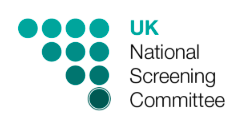October 2024 BSTG meeting notes
Published 8 October 2024
Update on projects
Members of the Blood Spot Task Group (BSTG) met on 1 October and were updated on progress on its ongoing projects.
The project on outcomes and data is being undertaken in 2 phases. In phase 1, the National Institute for Health and Care Research (NIHR) West Midlands evidence synthesis group (ESG) has been commissioned to develop a scoping review on methods and mechanisms to measure and monitor outcomes of newborn blood spot (NBS) screening. This work will identify the breadth of available evidence and will inform phase 2 when relevant methods and mechanisms identified in the scoping review will be evaluated.
Dr Jac Dinnes and Katie Scandrett from the NIHR West Midlands ESG gave a presentation on their progress so far in phase 1. A search of the literature from the past 5 years identified nearly 15,000 potential records and, after sifting, 1,675 of those are being taken forward to full text screening. It is hoped this process will be completed in November and a first draft of the scoping review will be ready in February 2025.
The modelling project is nearly complete. The Sheffield Centre for Health and Related Research (SCHARR) has submitted for publication its paper identifying challenges, opportunities and practical approaches when developing modelling for rare diseases.
Meanwhile, work continues to synthesise the findings of a literature review and workshop focusing on developing practical recommendations regarding test accuracy study designs suitable for NBS screening. The NIHR has agreed to take forward the next stage of this test accuracy project, starting in the new year.
Next steps for BSTG
The group discussed potential future projects and ways of working to support the core aim of helping the UK NSC make robust screening recommendations on rare diseases when good quality evidence is often limited.
Public health registrar Dr Tom Callender gave a presentation on one possible idea – a rolling in-service evaluation into NBS screening for multiple conditions. He led a discussion on how this might work while still adhering to the UK NSC’s principles of looking at the balance of benefits and harms for each and every condition.
This proposal will be discussed and explored further at the next BSTG meeting.
NIHR evidence synthesis support
The NIHR put out a call in the summer to commission additional evidence synthesis groups to provide dedicated support to the UK NSC starting from April 2025. The call for applications has now closed. Interviews of shortlisted candidates are expected to take place towards the end of the year.

